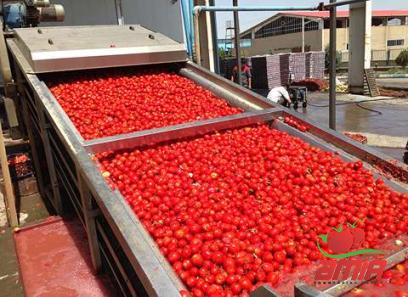Tomato paste is a staple ingredient in kitchens worldwide, valued for its rich umami flavor and versatility in various cuisines. In Japan, tomato paste holds a unique position, often celebrated for its quality and taste. The Japanese have a profound appreciation for culinary excellence, and their tomato paste is no exception. In this article, we will delve into the world of tomato paste in Japan, exploring its history, production methods, popular uses, and cultural significance. History of Tomato Paste in Japan: Tomatoes were introduced to Japan in the 16th century through trade with the Portuguese. Initially, tomatoes were considered ornamental plants rather than food. However, over time, the Japanese began incorporating tomatoes into their cuisine, leading to the development of tomato-based products like tomato paste. The production of tomato paste in Japan gained momentum in the early 20th century, with an increasing demand for concentrated tomato flavor in cooking. Production Methods: Japanese tomato paste is crafted with precision and care, reflecting the country’s dedication to quality food production. The tomatoes used for making tomato paste in Japan are typically grown in regions known for their fertile soil and favorable climate. These tomatoes are carefully selected for their ripeness, flavor, and texture. The production process begins with washing and sorting the tomatoes to ensure only the best quality fruits are used. The tomatoes are then blanched to remove the skins and seeds, leaving behind the fleshy part of the fruit. The tomatoes are cooked down slowly to concentrate their flavors, resulting in a thick and rich tomato paste. Unlike some commercial tomato pastes that may contain additives or preservatives, Japanese tomato paste is often produced using traditional methods with minimal ingredients. This commitment to natural and authentic flavors sets Japanese tomato paste apart from others in the market.

.
 Popular Uses of Tomato Paste in Japanese Cuisine: Tomato paste is a versatile ingredient in Japanese cooking, adding depth and complexity to a wide range of dishes. One of the most popular uses of tomato paste in Japan is in making sauces, such as the flavorful base for pasta sauces, curry sauces, and marinades. The umami-rich taste of tomato paste enhances the overall taste profile of the dish, making it a sought-after ingredient in both home kitchens and restaurants. In addition to sauces, tomato paste is also used in soups, stews, and braises to add a robust tomato flavor. It is often incorporated into dishes like nikujaga (a Japanese meat and potato stew) or omurice (a rice omelet topped with tomato-based sauce). The versatility of tomato paste in Japanese cuisine is a testament to its incredible flavor-enhancing properties. Cultural Significance: Tomato paste holds a special place in Japanese culture, symbolizing the harmony between tradition and innovation. While tomatoes themselves are a relatively recent addition to Japanese cuisine, tomato paste has seamlessly integrated into traditional dishes, offering a contemporary twist to classic recipes. The popularity of tomato paste in Japan is also reflected in the country’s culinary exports. Japanese tomato paste is highly regarded for its quality and flavor, making it a sought-after ingredient in international markets. The meticulous production methods and attention to detail in Japanese tomato paste production have earned it a reputation for excellence worldwide. Conclusion: In conclusion, tomato paste in Japan is not just a condiment but a symbol of culinary mastery and cultural appreciation for quality ingredients. From its humble beginnings as a foreign import to its current status as a gourmet staple, tomato paste has carved out a niche in Japanese cuisine.
Popular Uses of Tomato Paste in Japanese Cuisine: Tomato paste is a versatile ingredient in Japanese cooking, adding depth and complexity to a wide range of dishes. One of the most popular uses of tomato paste in Japan is in making sauces, such as the flavorful base for pasta sauces, curry sauces, and marinades. The umami-rich taste of tomato paste enhances the overall taste profile of the dish, making it a sought-after ingredient in both home kitchens and restaurants. In addition to sauces, tomato paste is also used in soups, stews, and braises to add a robust tomato flavor. It is often incorporated into dishes like nikujaga (a Japanese meat and potato stew) or omurice (a rice omelet topped with tomato-based sauce). The versatility of tomato paste in Japanese cuisine is a testament to its incredible flavor-enhancing properties. Cultural Significance: Tomato paste holds a special place in Japanese culture, symbolizing the harmony between tradition and innovation. While tomatoes themselves are a relatively recent addition to Japanese cuisine, tomato paste has seamlessly integrated into traditional dishes, offering a contemporary twist to classic recipes. The popularity of tomato paste in Japan is also reflected in the country’s culinary exports. Japanese tomato paste is highly regarded for its quality and flavor, making it a sought-after ingredient in international markets. The meticulous production methods and attention to detail in Japanese tomato paste production have earned it a reputation for excellence worldwide. Conclusion: In conclusion, tomato paste in Japan is not just a condiment but a symbol of culinary mastery and cultural appreciation for quality ingredients. From its humble beginnings as a foreign import to its current status as a gourmet staple, tomato paste has carved out a niche in Japanese cuisine.
..
 Its rich flavor, versatility, and cultural significance make it a must-have ingredient in any kitchen, whether you’re a home cook or a professional chef.Embrace the essence of Japan’s tomato paste and elevate your dishes to new heights of flavor and authenticity. SEO-optimized Section: The Best Japanese Tomato Paste Brands: When it comes to choosing the best tomato paste for your culinary creations, Japanese brands are known for their exceptional quality and flavor profiles. Here are some of the top Japanese tomato paste brands that have gained popularity both locally and internationally: 1. Kagome: Kagome is a well-known Japanese food company that produces a wide range of tomato products, including tomato paste. Their tomato paste is made from sun-ripened tomatoes and is known for its intense flavor and rich color. Kagome’s tomato paste is a favorite among home cooks and professional chefs for its superior quality. 2. Nijiya Market: Nijiya Market is a Japanese grocery store chain that offers a variety of authentic Japanese ingredients, including tomato paste. Their tomato paste is made from locally sourced tomatoes and follows traditional Japanese production methods. Nijiya Market’s tomato paste is prized for its natural sweetness and umami depth. 3. S&B Foods: S&B Foods is a renowned Japanese food company known for its range of spices, condiments, and sauces. Their tomato paste is made from premium Japanese tomatoes and is free from artificial additives. S&B Foods’ tomato paste is favored for its thick consistency and robust tomato flavor. 4. Aohata: Aohata is a longstanding Japanese food brand that specializes in fruit and vegetable-based products, including tomato paste. Their tomato paste is made from vine-ripened tomatoes and is carefully processed to preserve the natural flavors of the fruit. Aohata’s tomato paste is a staple in many Japanese households for its freshness and quality. 5. Delica: Delica is a premium Japanese brand that offers a range of gourmet ingredients, including tomato paste. Their tomato paste is made from organic tomatoes grown in Japan and is free from additives or preservatives. Delica’s tomato paste is prized for its authentic taste and silky texture, making it a favorite among discerning cooks.
Its rich flavor, versatility, and cultural significance make it a must-have ingredient in any kitchen, whether you’re a home cook or a professional chef.Embrace the essence of Japan’s tomato paste and elevate your dishes to new heights of flavor and authenticity. SEO-optimized Section: The Best Japanese Tomato Paste Brands: When it comes to choosing the best tomato paste for your culinary creations, Japanese brands are known for their exceptional quality and flavor profiles. Here are some of the top Japanese tomato paste brands that have gained popularity both locally and internationally: 1. Kagome: Kagome is a well-known Japanese food company that produces a wide range of tomato products, including tomato paste. Their tomato paste is made from sun-ripened tomatoes and is known for its intense flavor and rich color. Kagome’s tomato paste is a favorite among home cooks and professional chefs for its superior quality. 2. Nijiya Market: Nijiya Market is a Japanese grocery store chain that offers a variety of authentic Japanese ingredients, including tomato paste. Their tomato paste is made from locally sourced tomatoes and follows traditional Japanese production methods. Nijiya Market’s tomato paste is prized for its natural sweetness and umami depth. 3. S&B Foods: S&B Foods is a renowned Japanese food company known for its range of spices, condiments, and sauces. Their tomato paste is made from premium Japanese tomatoes and is free from artificial additives. S&B Foods’ tomato paste is favored for its thick consistency and robust tomato flavor. 4. Aohata: Aohata is a longstanding Japanese food brand that specializes in fruit and vegetable-based products, including tomato paste. Their tomato paste is made from vine-ripened tomatoes and is carefully processed to preserve the natural flavors of the fruit. Aohata’s tomato paste is a staple in many Japanese households for its freshness and quality. 5. Delica: Delica is a premium Japanese brand that offers a range of gourmet ingredients, including tomato paste. Their tomato paste is made from organic tomatoes grown in Japan and is free from additives or preservatives. Delica’s tomato paste is prized for its authentic taste and silky texture, making it a favorite among discerning cooks.
…
 How to Use Japanese Tomato Paste in Your Cooking: Now that you’re familiar with the best Japanese tomato paste brands, let’s explore some creative ways to incorporate this flavorful ingredient into your cooking: 1. Pasta Sauces: Use Japanese tomato paste as a base for your pasta sauces to add depth and richness to the dish. Combine tomato paste with garlic, onions, herbs, and a splash of olive oil for a simple and delicious pasta sauce that will elevate your spaghetti or penne dishes. 2. Curry Pastes: Add a spoonful of Japanese tomato paste to your curry pastes to enhance the color and flavor of the curry. The tangy sweetness of the tomato paste will balance out the spices and create a well-rounded curry that is both aromatic and delicious. 3. Meat Marinades: Create flavorful meat marinades by mixing Japanese tomato paste with soy sauce, ginger, and garlic. Marinate your meat for a few hours or overnight to let the flavors penetrate the meat, resulting in tender and juicy grilled or roasted dishes. 4. Pizza Toppings: Spread a thin layer of Japanese tomato paste on your pizza base before adding toppings for a rich and tangy flavor. Pair the tomato paste with fresh mozzarella, basil, and other toppings of your choice for a gourmet pizza experience that will impress your family and friends. 5. Salad Dressings: Whisk Japanese tomato paste with olive oil, balsamic vinegar, and mustard for a zesty salad dressing that will liven up your greens. Drizzle the dressing over mixed greens, tomatoes, cucumbers, and feta cheese for a refreshing and flavorful salad. Incorporating Japanese tomato paste into your cooking repertoire will not only elevate the flavors of your dishes but also introduce you to the authentic taste of Japanese cuisine. Experiment with different recipes and techniques to discover the versatility and richness of Japanese tomato paste in your kitchen.
How to Use Japanese Tomato Paste in Your Cooking: Now that you’re familiar with the best Japanese tomato paste brands, let’s explore some creative ways to incorporate this flavorful ingredient into your cooking: 1. Pasta Sauces: Use Japanese tomato paste as a base for your pasta sauces to add depth and richness to the dish. Combine tomato paste with garlic, onions, herbs, and a splash of olive oil for a simple and delicious pasta sauce that will elevate your spaghetti or penne dishes. 2. Curry Pastes: Add a spoonful of Japanese tomato paste to your curry pastes to enhance the color and flavor of the curry. The tangy sweetness of the tomato paste will balance out the spices and create a well-rounded curry that is both aromatic and delicious. 3. Meat Marinades: Create flavorful meat marinades by mixing Japanese tomato paste with soy sauce, ginger, and garlic. Marinate your meat for a few hours or overnight to let the flavors penetrate the meat, resulting in tender and juicy grilled or roasted dishes. 4. Pizza Toppings: Spread a thin layer of Japanese tomato paste on your pizza base before adding toppings for a rich and tangy flavor. Pair the tomato paste with fresh mozzarella, basil, and other toppings of your choice for a gourmet pizza experience that will impress your family and friends. 5. Salad Dressings: Whisk Japanese tomato paste with olive oil, balsamic vinegar, and mustard for a zesty salad dressing that will liven up your greens. Drizzle the dressing over mixed greens, tomatoes, cucumbers, and feta cheese for a refreshing and flavorful salad. Incorporating Japanese tomato paste into your cooking repertoire will not only elevate the flavors of your dishes but also introduce you to the authentic taste of Japanese cuisine. Experiment with different recipes and techniques to discover the versatility and richness of Japanese tomato paste in your kitchen.










Your comment submitted.